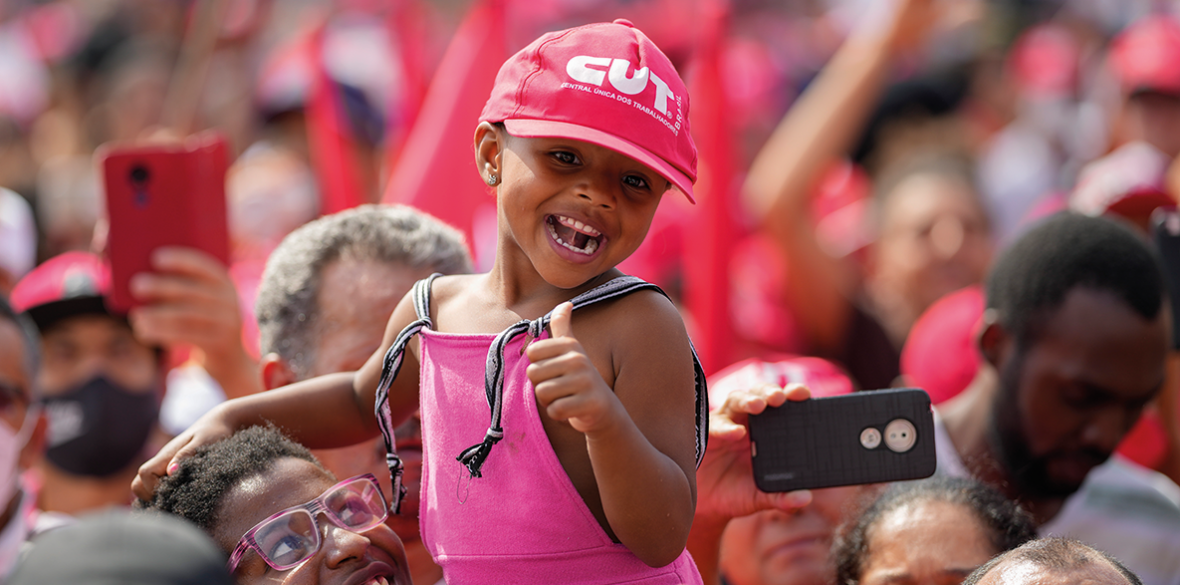This is the last article you can read this month
You can read more article this month
You can read more articles this month
Sorry your limit is up for this month
Reset on:
Please help support the Morning Star by subscribing here
ON JANUARY 1, we saw President Lula da Silva take office in Brazil after his historic election victory over Bolsonaro.
Bringing an end to years of far-right rule, Lula’s inauguration was cause for celebration around the globe, closing a dark period of Brazilian history.
Having served two consecutive terms previously between 2003-11, Lula’s administration looks to return to, and rebuild, the hugely successful programmes implemented during his last stint in office.
His past achievements in government include implementing ground-breaking poverty reduction programmes, eradicating adult illiteracy, massively improving access to healthcare and education and enshrining environmental protections.
Sadly, all of these gains have been rolled back or eroded under the far right. First by coup-president Michel Temer who took power through parliament’s coup against Lula’s successor and Brazil’s first female president, Dilma Rousseff, back in 2016; and second by the global far-right figurehead and former military captain Jair Bolsonaro.
The damage caused by Bolsonaro’s government can be seen across many sectors of Brazilian society with environmental deforestation, extrajudicial killings, hate crime and attacks on Brazil’s indigenous communities skyrocketing during his term.
His record during the pandemic was nothing short of criminal, continually spreading misinformation and downplaying the severity of the crisis while the bodies piled up.
For all these reasons and more, Lula’s election victory was a moment of inspiration and relief for progressive movements around the globe, yet it was not long before the lasting threat of the far right presented itself.
On January 8, Bolsonaro’s supporters stormed the Brazilian capital refusing to accept the election result and laying waste to Brazil’s democratic institutions — the Congress, Supreme Court and presidential palace.
Many of these far-right vandals carried banners calling for the military to carry out a coup as they smashed up offices, destroyed artwork and rampaged through these symbolic places of power.
Brazil’s history has many examples of military coups and coup attempts, with Latin America’s most populous country only returning to democracy in 1985, 21 years after the military coup against president Joao Goulart.
This context is an important factor when assessing the January 8 attack — this was an assault on democracy itself, and these acts of violence, intimidation and vandalism were aimed at undermining President Lula da Silva’s newly elected government.
Bolsonaro’s administration was stacked full of military officials, with over 8,000 active and retired military personnel serving at various levels of government.
His long-standing connections with military police are also well-documented, leading activists and journalists to fear that the far right will continue to lay down the grounds for a coup.
Thankfully, Brazilian civil society and the huge movement behind Lula were quick to respond. Members of the Supreme Court, state governors and national congresspeople immediately condemned the attack while tens of thousands of demonstrators took to cities across the country showing their support for democracy.
Internationally, leaders from across Latin America and the world showed solidarity with Lula, while demonstrations vocally defending democracy were held in cities across the globe, including a demo held outside the Brazilian embassy in London.
In Parliament, an early day motion was also tabled by Brazil Solidarity Initiative (BSI) chair Richard Burgon MP, and the motion has now been signed by 34 MPs.
The BSI has also launched a public statement for activists to add their name in support of Brazilian democracy and stand with Lula against far-right violence and intimidation.
Huge questions remain over Bolsonaro’s role in the attack, despite his silence and cautious condemnation of the event, and the role of the military and security forces on the day.
Lula has responded by removing the head of the military Julio Cesar de Arruda after it was reported that he stopped police arresting far-right rioters who took refuge outside of the army headquarters.
He has also removed over 80 military officials from the presidential palace and other key areas as the investigation into the attack continues.
The far-right assault has shown the importance of international solidarity with Lula and the mass movement for democracy behind him.
Despite being beaten at the ballot box, Bolsonaro’s authoritarian base will do anything to cling to power. The international community must make it clear that it stands by the democratic will of the Brazilian people.
But while we must remain vigilant, we can also be inspired by the return of a progressive, trade unionist president who is a well-respected champion against global inequality.
Even before the attack, Lula’s government had set in motion a series of policies and reforms repairing the deep damage of Bolsonaro’s rule.
These include reversing a number of Bolsonaro’s reactionary presidential decrees; stopping the privatisation of eight state-owned companies; recommitting financial support for the protection of the Amazon; repealed measures on illegal mining; and suspending the issuance of new gun permits.
Lula’s policies will directly and positively change the lives of tens of millions of Brazilians. And for that, we will keep celebrating.
Patrick Foley is the co-ordinator of the Brazil Solidarity Initiative. You can lobby your MP to sign the early day motion condemning the attack on Brazil’s Congress at brazilsolidarity.eaction.online/solidaritywithlula.
You can add your name the public statement in support of Lula and Brazilian democracy at bit.ly/westandwithlula.










